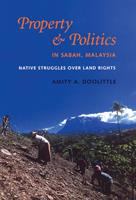
Property and Politics in Sabah, Malaysia
by Amity A. Doolittle, K. Sivaramakrishnan (Series edited by)
ISBN-10: 0295987626
ISBN-13: 9780295987620
$32.00
Book Specs
Perfect
Palgrave Macmillan
Published on
Jan 1, 2007
Edition
1st Edition
Dimensions
5.50x0.63x8.50 Inches
Weight
0.94 Pounds
About the Book
In 1990, shortly after a Malaysian politician announced that the boundaries of Kinabalu Park, a primary tourist destination, were to be expanded to include the species-rich tropical forest known locally as Bukit Hempuen, most of the area was burned to the ground, allegedly by local people. What would motivate the people who had for generations hunted and gathered forest products there to act so destructively?
In this volume, Amity Doolittle illuminates this and other contemporary land-use issues by examining how resources were used historically in Sabah from 1881 to 1996 and what customary rights of access to land and resources were enjoyed by local people. Drawing upon anthropology, political science, environmental history, and political ecology, she looks at how control over and access to resources have been defined, negotiated, and contested by colonial state agents, the postcolonial Malaysian state, and local people.
The study is grounded in methodological and theoretical advances in the field of political ecology, merging the traditions of human ecology and political economy and looking at environmental conflicts in terms of the particulars of place, culture, and history. Doolittle assumes that environmental problems have causes that are complex and changing and that solutions must be specific to time and place. Using a political ecology perspective allows her to focus on the root causes of environmental degradation, exposing the underlying political, economic, and social forces at work. The challenge in the twenty-first century, she writes, is to move beyond blaming local people for resource degradation and to find ways to achieve equitable access to natural resources and more sustainable land use practices.
Property and Politics in Sabah, Malaysia has great relevance to development studies, political ecology, environmental planning, anthropology, and legal studies in natural resource management.
